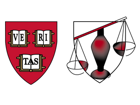Posts filed under 'video'
Organizations that develop open source software are often inherently fragmented and loosely-networked, which can make governance and decision-making a challenge. In addition, as the open source community grows and becomes more global, so too has the need to establish strong governance models and corporate structures that allow an organization to achieve its mission, and foster a sustainable community both creatively and financially. In order to do this, it is helpful for open source organizations to understand the corporate structures and governance models available to them so they may evaluate the pros and cons of different approaches to institutional management and financial structure.
In this talk, Dalia Topelson Ritvo — Assistant Director of Harvard Law School’s Cyberlaw Clinic — and Kira Hessekiel — Project Coordinator of Harvard Law School’s Cyberlaw Clinic — discuss the various corporate structures and governance models available to open source organizations, including a discussion on when it is appropriate for an open source organization to seek tax exempt status.
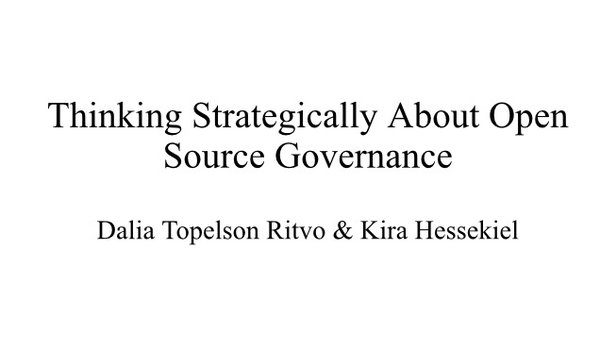
Also in ogg for download
More on this event here
May 31st, 2016
Every 500 years or so, European civilization and now world civilization, has been rocked by fundamental shifts in its value regime, in which the rules of the game for acquiring wealth and livelihoods have dramatically changed. Following Benkler’s seminal Wealth of Networks, which first identifies peer production, the P2P Foundation has collated a vast amount of empirical evidence of newly emerging value practices, which exist in a uneasy relationship with the dominant political economy, and of which some authors claim, like Jeremy Rifkin and Paul Mason, that it augurs a fundamental shift. What would be the conditions for this new regime to become autonomous and even dominant, and what are the signs of it happening? As context, we will be using the Tribes, Institutions, Markets, Networks framework of David Ronfeldt, the Relational Grammar of Alan Page Fiske, and the evolution of modes of exchange as described by Kojin Karatini in The Structure of World History. We will argue that there is consistent evidence that the structural crises of the dominant political economy is leading to responses that are prefigurative of a new value regime, of which the seed forms can be clearly discerned.
About Michel
Michel Bauwens is the founder and director of the P2P Foundation and works in collaboration with a global group of researchers in the exploration of peer production, governance, and property. Bauwens travels extensively giving workshops and lectures on P2P and the Commons as emergent paradigms and the opportunities they present to move towards a post-capitalist world.
In the first semester of 2014, Bauwens was research director of the floksociety.org which produced the first integrated Commons Transition Plan for the government of Ecuador, in order to create policies for a ‘social knowledge economy’.
In January 2015 CommonsTransition.org was launched. Commons Transition builds on the work of the FLOK Society and features newly revised and updated, non-region specific versions of these policy documents. Commons Transition aims toward a society of the Commons that would enable a more egalitarian, just, and environmentally stable world.
He is a founding member of the Commons Strategies Group, with Silke Helfrich and David Bollier, who have organised major global conferences on the commons and economics. http://commonsandeconomics.org
His recent book ‘Save the world – Towards a Post Capitalist Society with P2P’ is based on a series of interviews with Jean Lievens, originally published in Dutch in 2014 it has since been translated and published in French with an English language publication expected in the near future http://www.samkinsley.com/2015/03/31/to-save-the-world-preface-by-bernard-stiegler-for-michel-bauwens-new-book/
In more academic work Michel co-authored with Vasilis Kostakis ‘Network Society and Future Scenarios for a Collaborative Economy’ published by Palgrave Pivot in 2014. http://p2pfoundation.net/Network_Society_and_Future_Scenarios_for_a_Collaborative_Economy
He has also writen for Al Jazeera and Open Democracy. He is listed at #82, on the Post Growth Institute (En)Rich list. http://enrichlist.org/the-list/
Michel currently lives in Chiang Mai, Thailand.
Links
- A short overview of P2P Theory
- Related frameworks:

Also in ogg for download
More on this event here
May 24th, 2016
While 94% of parents raising school-age children below the U.S. median household income have an Internet connection, more than half are “under-connected,” in that their Internet connection is too slow, has been interrupted in the past year due to non-payment, and/or they share their Internet-connected devices with too many people.
In this talk, Vikki Katz — Associate Professor in the Department of Communication, and Affiliate Graduate Faculty in the Department of Sociology, at Rutgers University — discusses how being under-connected impacts the everyday lives of lower-income parents and children, how parents assess the risks and rewards that connectivity can offer their children, and the implications of under-connectedness for policy development and program reform.

Also in ogg for download
More on this event here
May 17th, 2016
What is it like to use the Internet in fits and starts? How do communities with limited access to the global Internet use digital tools? Beyond sensational media narratives about Havana’s WiFi hotspots and the paquete semanal, there is a complex landscape of Internet access, digital media use and open source software development in Cuba. In this talk Ellery Biddle — Advocacy Director for Global Voices and Berkman Fellow — offers a primer on Cuba’s digital culture and critique of Western political narratives surrounding technology, freedom and empowerment as they apply in the Cuban context.

Also in ogg for download
More on this event here
May 11th, 2016
The social nature of today’s Internet is creating new public health and policy challenges. For example, the US in 2014 experienced the largest measles outbreak in nearly a generation, which led to the passing of the nation’s most conservative vaccine legislation, eliminating the personal belief exemption in California. Research has identified online misinformation about vaccines as one of the risk factors for this outbreak.
In this talk, Dr. Brittany Seymour — Assistant Professor at Harvard School of Dental Medicine and Berkman Fellow — examines three big data case analyses (water fluoridation, the Ebola epidemic, and childhood vaccinations) to explore ways to employ network science to develop social communication strategies for public health that using the power of the Internet.
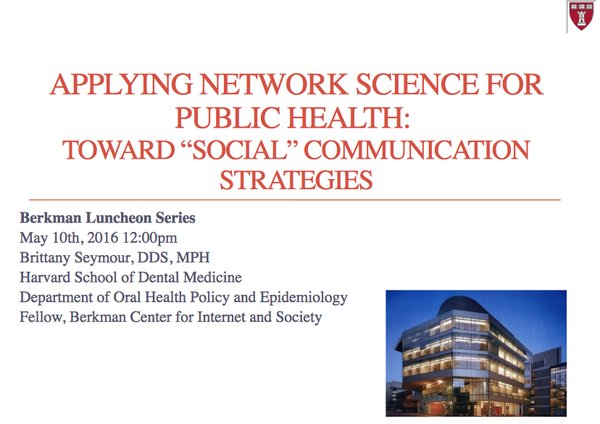
Also in ogg for download
More on this event here
May 10th, 2016
Following the 2014 Google Spain decision rendered by the European Court of Justice of the European Union, search engines – and, first among them, Google – are tasked with the delisting of search results leading to outdated or inaccurate information about European citizens. This ‘right to be delisted’ has since then revealed itself as a highly controversial concept, raising issues such as the desired degree of protection of personal data over the Internet and the role of the act of forgetting in the digital age; it also highlighted the lack of an existing consensus over these questions between individual jurisdictions – and namely between the European Union and the United States.
On 14 April 2016, the European Parliament has adopted the General Data Protection Regulation, which will, in two years from now, update and harmonize data protection law all across the Member States of the European Union. Its article 17 contains a ‘right to erasure’ or a ‘right to be forgotten’ which is set to formalize, unify and extend the existing Google Spain ruling.
But how to make that happen in practice? How can legal fragmentation be prevented? Relying on his background in conflict of laws, Dr. Michel Reymond shows that finding common standards for the Right to be Forgotten will prove extremely difficult – not only regarding its procedural elements, but also when addressing its substance. He also argues that, before even starting a conversation between the U.S. and the E.U., some soul-searching about the nature of the right may need to be performed inside the E.U. itself first.
About Michel
Dr. Michel J. Reymond is currently a visiting researcher at the Berkman Center for Internet & Society under a stipend from the Swiss National Foundation. With a background in private international law and comparative law at the University of Geneva, his work is mainly centered on the relationship between regulation, competing legal orders, and the Internet. His PhD thesis, which was developed alongside Prof. Thomas Kadner Graziano, focused on defamation on the Internet in private international law. More recently, his topics of research have included wider issues about Internet regulation, and in particular the “right to be forgotten” decision by the European Court of Justice. Having served as assistant for 3 years at his home university, Michel J. Reymond is also dedicated to teaching and has notably coached local students for the Vienna Moot Court Competition.
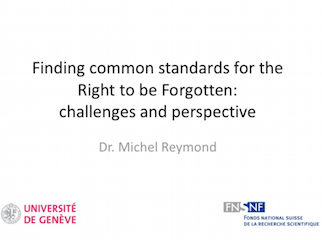
Also in ogg for download
More on this event here
May 4th, 2016
Carl Williams joins us to speak about the current Black Liberation movement. What and who it is, how it started, and how Twitter, Facebook (yes, Facebook) and other social media played a part.
About Carl
Carl joined the ACLU of Massachusetts as staff attorney in September 2013. He was previously a criminal defense attorney with the Roxbury Defenders Unit of the Committee for Public Counsel Services. Carl is a graduate of the University of Rhode Island and the University of Wisconsin Law School.
A long-time resident of Boston’s Roxbury neighborhood, he has been an activist and organizer on issues of war, immigrants’ rights, LGBTQ rights, racial justice and Palestinian self-determination. Carl is a member of the National Lawyers Guild and has served on its Massachusetts board of directors. During the Occupy Boston movement he was part of its legal defense and support team, which provided nearly 24-hour support to the participants.
More recently, Carl was a Givelber Distinguished Lecturer on Public Interest Law at Northeastern University School of Law, where he taught a class on social justice movements and the law.

Also in ogg for download
More on this event here
May 3rd, 2016
The U.S. still lags behind much of the developed world in terms of the speed and density of its internet infrastructure. In the 21st Century this disparity in access to high speed internet could stand as a critical challenge to competitiveness in many areas, from industry and commerce, to healthcare and education, to civic life and culture.
In this conversation, Susan Crawford — John A. Reilly Clinical Professor of Law at Harvard Law School and a co-director of the Berkman Center — discusses the potential futures we face as we consider how to invest in the wires that bring us our internet.
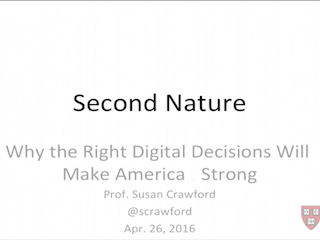
Also in ogg for download
More on this event here
April 28th, 2016
With Internet censorship and mass surveillance on the rise globally, understanding regulatory “chilling effects” — the idea that laws, regulations, or state surveillance can deter people from exercising their freedoms or engaging in entirely legal activities — has thus today, in our Post-Snowden world, taken on greater urgency and public importance.
In this talk, Jon Penney — doctoral candidate at the Oxford Internet Institute, University of Oxford (Balliol College), and a research fellow at the Citizen Lab, Munk School of Global Affairs, University of Toronto — fills in some of the gaps in our understanding of chilling effects online. Through discussion of three empirical legal case studies — one on surveillance-related chilling effects and Wikipedia, a second on the impact of the DMCA’s copyright enforcement scheme, and a third survey-based study on “chilling effect scenarios” — Jon offers insights into the nature and scale of regulatory chilling effects online.

Also in ogg for download
More on this event here
April 28th, 2016
In this talk, Alan Weinberger — founder of The ASCII Group, Inc. and Harvard Law School alum — addresses the development of the information technology marketplace over the past three decades and the continued importance of small IT companies.
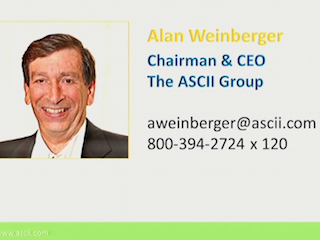
Also in ogg for download
More on this event here
April 21st, 2016
Previous Posts










